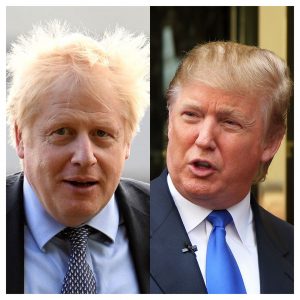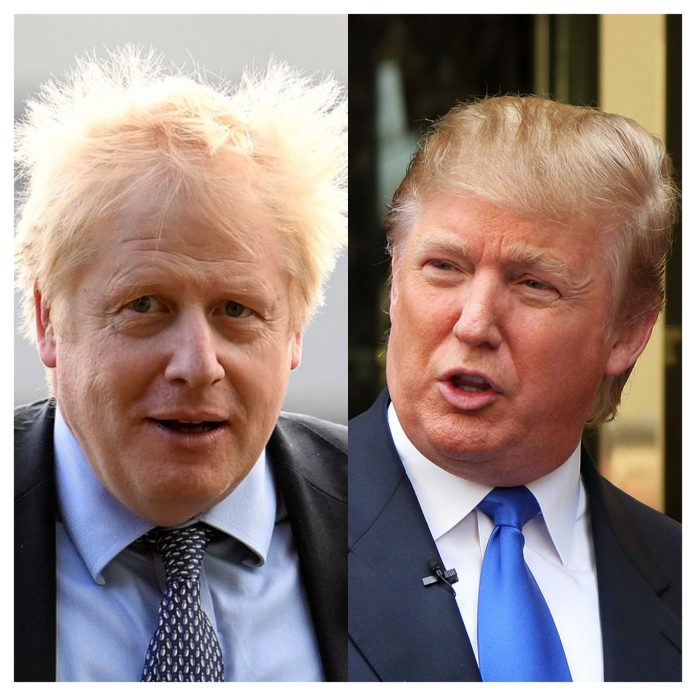 Boris Johnson and Donald Trump
Boris Johnson and Donald Trump
By Raheem Ishola
That the west colonised Africa is not arguable and is never in doubt.
During those period, Africans were treated like second class citizens and the colonial masters succeeded in imposing their culture and belief on the people of the continent. The aftermath left both positive and negative effects on the people and these are still being felt till date.
After colonisation came independence, which led to sovereignty and self-government that ought to have severed African countries from the shackles of the western world albeit European and American countries.
Indeed, it appears the western countries of Europe and America are not willing to let go and they have introduced neo-colonialism to further impose their will and belief on African nations.
When some unpalatable issues happen in the corridors of power or even among the citizens of Europe and America they are seen as part of development and democracy and natural human errors, but when they happen in Africa, then the west condemn such in strong terms and see the need for intervention and sanctions, and in the process term Africa as underdeveloped and insist that the people of the continent have “not seen the light.” The dichotomy is better experienced than imagined.
It is no news that Europe and America treat many African nations as pariah anytime issues like threat to democracy, corruption or abuse of power occur.
Oftentimes, Europe and America paint a picture of a world, where the west is free of evil and crime to an extent and they say countries in Africa, perceived to be the third world, are made of “corrupt and evil men,” thus Africa is seen as “the dark continent.”
Even, when there is threat to security or economic crisis in any African nation, the west would see these as serious issues that should attract sanctions and punishments by the United Nations and world powers.
They will give warnings and directives to their citizens against such country without understanding the situation, the circumstances that warrant such or coming up with pieces of advice/ suggestions that could lead to solutions.
But, when such happen in a developed nation, they go for forms of defence and make them look like unavoidable incidents in any given society.
Just last week, British Prime Minister, Boris Johnson had to resign from office over abuse of office and several allegations that have led to the exit of some of his cabinet members.
Sequel to that, former president Donald Trump of the United States of America has been under probe over his refusal to accept the results of the 2020 presidential election that was won by President Joe Biden.
The matter got to the extent that loyalists of Donal Trump invaded the US parliament in Capitol Hill and destroyed properties worth millions of dollars.
Trump’s supporters tried to break through a police barrier on Wednesday, January 6, 2021, at the Capitol in Washington, D.C as Congress prepared to affirm the then President-elect Joe Biden’s victory.
Despite the evidences against Donald Trump, the majority of GOP Congress members, and the majority of Republican voters, remain fiercely loyal to him, entirely wrapped up in their alternate reality.
All these are never seen as threats to the democracies of these two world powers unlike the way they are seen in Africa.
The issues of Donald Trump and Boris Johnson are yet to attract criticism from world powers, unlike what would have been the case if any of them were to be an African leader.
For Trump, it was a case of losing an election, but insisting on being declared winner, while Boris Johnson preferred to “sleep, while Rome burns.”
Boris Johnson’s cabinet members resigned enmasse amidst controversies, but he preferred to stay in office until he was forced to relinquish power and throw in the towel at the last minute, when it appears there was no going back.
In June 2022, after months of scandals, Conservative MPs triggered a no-confidence vote in his leadership of Boris Johnson.
Johnson survived, but with only 59 percent of his MPs supporting him; it was a devastating blow for a leader who had long viewed himself as electorally invulnerable. In the weeks following, with public support for Johnson and for the Tories crumbling, with inflation, as measured by the consumer price index, heading toward 10 percent, with the country’s economic growth predicted to be stagnant in 2023, and the British currency plunging, the Conservative Party badly lost two by-elections, one of them in a district the party had held for more than a hundred years.
And the scandals kept rolling in.
The resignations began Tuesday night, when Chancellor Rishi Sunak and Health Secretary Sajid Javid very publicly quit the government. They accelerated Wednesday, both before and after a brutal Prime Minister’s Question Time, in which Johnson was repeatedly barracked not just from the opposition but also from those sitting on the Tory party benches. Javid gave an extraordinary speech in Parliament about the importance of honor and integrity, and the impossibility of continuing to defend the acts of Johnson’s government.
On Wednesday night, a number of Johnson’s most senior cabinet members trouped to 10 Downing Street to tell him he had to step down. He refused. The Guardian ran a banner headline in its print edition: “Desperate, deluded PM clings to power.” Early Thursday morning, newly appointed Chancellor Nadhim Zahawi said that the PM needed to “do the right thing and go now.” Meanwhile, Johnson’s defense secretary, Ben Wallace, urged his parliamentary colleagues in the Conservative Party to vote Johnson out of office. The newly appointed education secretary resigned, and previously valued advisers such as Dominic Cummings urged MPs to kick Johnson out immediately.
By 9 AM Thursday, more than 50 members of the government had resigned. And yet Johnson and his inner circle were still swearing that he would stay in office, absurdly claiming that he, and he alone, had a “mandate” from voters that couldn’t be annulled by his parliamentary colleagues. It was as close to a “l’État c’est moi” vision of politics as anything ever articulated by a UK prime minister.
Fifteen minutes later, however, the game was up. A brief announcement from Downing Street declared that Johnson would be resigning later in the day—though it also stated that he intended to stay on as PM until October, when the Conservative Party could choose a new leader at its annual conference.
It was almost inconceivable that Johnson’s attempt to remain in office for three months will hold water. Johnson is neither trusted nor liked anymore, with erstwhile colleagues convinced that he is now a menace to the democracy. Far more likely, therefore, is that by week’s end he will have been forced to vacate 10 Downing Street and a caretaker PM will have been installed. It is an entirely humiliating, almost Shakespearian, denouement for a man who tried to personalize power more than any recent British prime minister, but who has ended up alienating almost all of his erstwhile allies and friends.
Boris Johnson’s demise is a massive victory for those in the UK who value the bedrock principles of democracy and parliamentary accountability. It is a long-overdue righting of Britain’s ship of state.
All of which stands in stark contrast to what is going on in the United States on Donald Trump.
But all these still point to the fact that Africans could have their own challenges, but the people and the continent should be allowed to make their mistakes and proffer solutions to their problems.
While it might not be out of place for the western world to offer suggestions, where and when necessary, such should not be done in bad faith.
They should understand the peculiarities of African nations and allow them to grow and develop in their own way and offer assistance, where necessary.
Africa is never a dark continent, Africans have their own culture and peculiarities.
Left alone, it would be a matter of time before Africa catches up with the western world despite all the challenges, mistakes and errors that could be seen amongst the ruling class in different African nations.
Raheem Ishola is a political analyst and International Relations expert.

